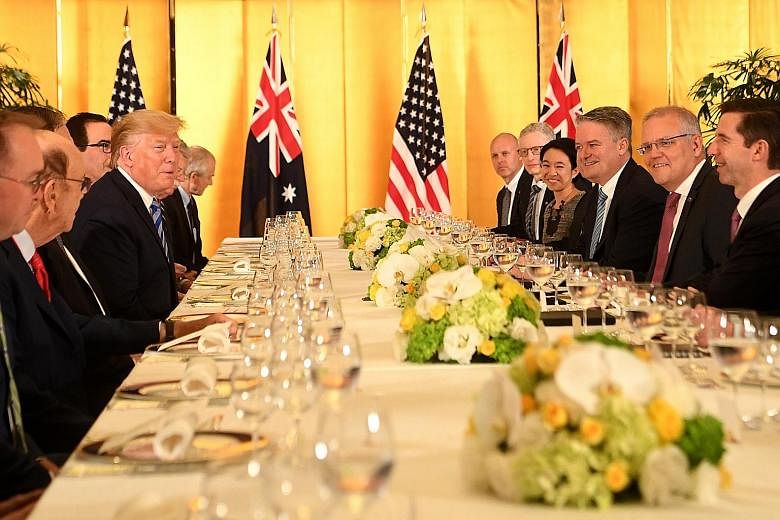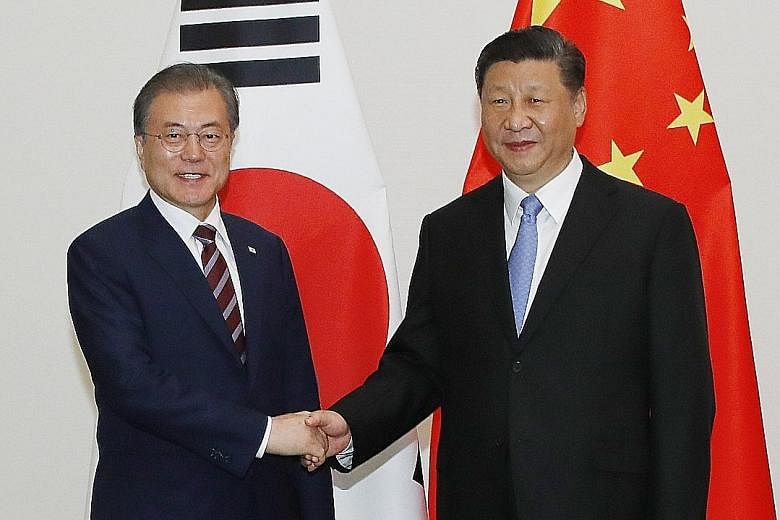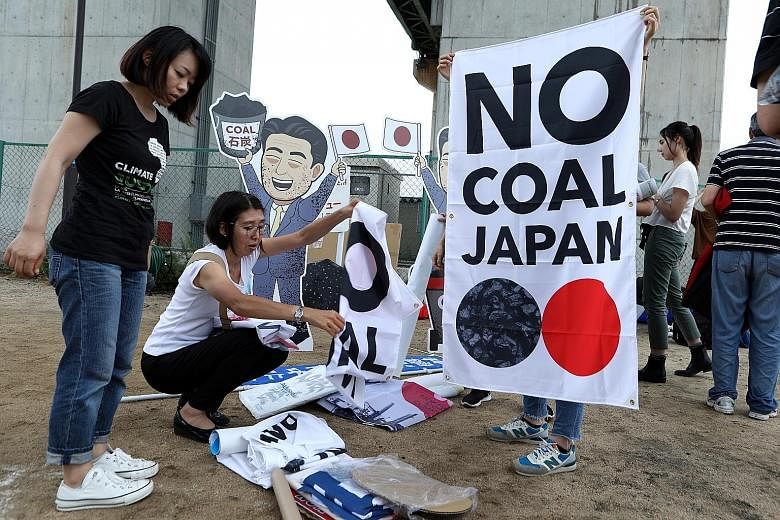Chinese President Xi Jinping and Japanese Prime Minister Shinzo Abe yesterday vowed to turn a new page on the frosty ties between the two Asian economic superpowers, redefining their relations as "eternal neighbours" that will not allow ties to deteriorate again.
This comes as Mr Xi became the first Chinese President to visit Japan in nine years - since then President Hu Jintao went to Yokohama in 2010 for the Apec meeting.
Mr Abe invited Mr Xi as a state guest in spring next year, during which he will have an audience with Emperor Naruhito.
"We would like to welcome President Xi as a state guest around the time of the cherry blossoms next spring and wish to take Japan-China relations to a higher level."
Mr Xi replied that the plan was a "good idea" and will crystallise "a new atmosphere that we have not seen for many years".
Bilateral ties have been marred because of a territorial spat over a group of East China Sea islets known as Senkaku in Japan and Diaoyu in China, but have been on the mend since the two nations agreed to build forward-oriented ties last year.
The two leaders agreed to "have permanent and close communication as eternal neighbours", according to a readout of the summit by Japanese Foreign Press Secretary Takeshi Osuga.
Mr Osuga said that during the two leaders' hour-long summit, Mr Abe highlighted the importance of a free and open Hong Kong that is prosperous under the "one country, two systems" model, with a controversial extradition Bill, suspended indefinitely by Hong Kong Chief Executive Carrie Lam, in mind.
Mr Abe also urged Chinese restraint in the East China Sea and South China Sea, where Chinese military build-up has been a major cause of concern in the region.
On both issues, however, Mr Osuga declined to elaborate on Mr Xi's response beyond what "has been the Chinese position".
This was part of a flurry of diplomatic activity yesterday as leaders from the world's 20 most eminent economies began converging in Osaka for the two-day Group of 20 Summit starting today.
The leaders of eight countries, including Singapore's Prime Minister Lee Hsien Loong, have been invited as observers.
Mr Xi, who visited Pyongyang last week, also met South Korean President Moon Jae-in.
"(North Korean leader Kim Jong Un's) intentions on denuclearisation are unchanged," Mr Xi was quoted as saying by South Korean presidential spokesman Ko Min-jung. "He is following a new strategic direction, focusing on economic development and improving people's livelihood, and hopes for the external environment to be improved," Ms Ko said, adding that Mr Xi was relaying Mr Kim's words.
The Free and Open Indo-Pacific vision to support a rules-based regional order and promote development assistance in the region was also discussed by Mr Abe in his separate meetings with Indian Prime Minister Narendra Modi and Australian counterpart Scott Morrison.
Mr Abe told reporters yesterday that he hopes the leaders will be able to find common ground despite their differences on a wide range of views, as the G-20 Summit talks kick off. "In the international community people tend to emphasise confrontation, but Japan as president wishes to seek convergence and points in common rather than differences in views," he said.
While much of the discussion will centre on trade, activists are hoping to train the world's attention on their respective causes.
Mr Xi may have deflected Mr Abe's concerns on Hong Kong, but a protest has been scheduled today in Osaka's entertainment district of Namba against the extradition Bill that, if passed, would allow Hong Kong to extradite people to jurisdictions including mainland China.
Many fear that this law will be used against critics of Beijing and political dissidents.
Separately, in a protest against Japan's heavy reliance on coal, environmental activists gathered outside a coal-fired power station in neighbouring Kobe city yesterday, where they released a 4m-tall blimp of Mr Abe. The organisers said they have amassed 80,843 signatures in an international petition calling on Mr Abe to do more to achieve a low-carbon future.



